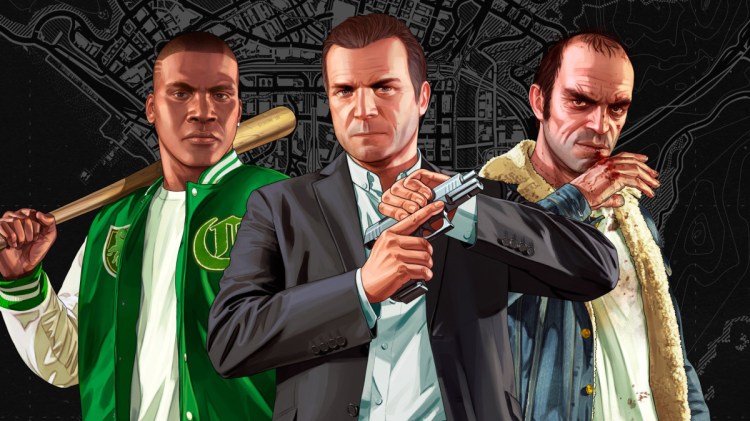Two names dominated the last decade of video games: Rockstar and Call of Duty. Grand Theft Auto V is the best-selling game from 2010 through the end of 2019 in the United States, according to industry-tracking firm The NPD Group. Call of Duty, meanwhile, made up seven of the top 10 best-selling games through that 10-year period.
NPD provided the top 20 for the 2010s as well as the 2000s. And the charts tell a story of familiar brands rising to the top. Let’s take a look and then dive into what it all means.
Top 20 best-selling games from 2010 through 2019 in the U.S.
- Grand Theft Auto V
- Call of Duty: Black Ops
- Call of Duty: Black Ops II
- Call Of Duty: Modern Warfare 3
- Call of Duty: Black Ops III
- Call Of Duty: Ghosts
- Red Dead Redemption II
- Call of Duty: WWII
- Call of Duty: Black Ops IIII
- Minecraft
- Call of Duty: Advanced Warfare
- Call of Duty: Modern Warfare 2019
- Elder Scrolls V: Skyrim
- Mario Kart 8
- Call of Duty: Infinite Warfare
- Battlefield 1
- Battlefield 4
- Destiny
- The Legend of Zelda: Breath of the Wild
- Star Wars Battlefront 2015
Top 20 best-selling games from 2000 through 2009 in the U.S.
- Guitar Hero III Legends Of Rock
- Wii Fit
- Rock Band
- Wii Play W/ Remote
- Guitar Hero World Tour
- Call Of Duty: Modern Warfare 2
- Call Of Duty 4: Modern Warfare
- Mario Kart Wii
- Grand Theft Auto: San Andreas
- Call Of Duty: World At War
- Guitar Hero 2
- Rock Band 2
- Madden NFL 07
- Halo 3
- Madden NFL 08
- Grand Theft Auto: Vice City
- Madden NFL 09
- Halo 2
- Grand Theft Auto IV
- Madden NFL 06
2010s was all Call of Duty and Rockstar
The storyline of the 2010s is the dominance of Call of Duty and Rockstar Games. GTA V has finished in the top 20 best-selling games almost every month since it debuted in 2013. In 2018 and 2019, it was still the No. 11 best-selling game of the year. And Rockstar didn’t just have GTA. The next non-Call of Duty in the top 10 is Red Dead Redemption II at No. 7.
But you can see how huge Call of Duty is just by glancing at the chart. It is half of the entries for the entire top 20. Of course, that’s every Call of Duty from the last decade. You can also see the overall trajectory for the franchise.
June 5th: The AI Audit in NYC
Join us next week in NYC to engage with top executive leaders, delving into strategies for auditing AI models to ensure fairness, optimal performance, and ethical compliance across diverse organizations. Secure your attendance for this exclusive invite-only event.
The best-selling Call of Duty of the 2010s was Call of Duty: Black Ops from 2010. And the rest of those first-half of the decade games are bunched up near the top until Advanced Warfare. That 2014 release is all the way down at No. 11, and then 2016’s Infinite Warfare is No. 15. Ignoring Modern Warfare (2019), which has only had a few months of sales, the series obviously had a downturn as it went more sci-fi.
You can see why Activision is so intent on keeping Call of Duty with “boots on the ground” going forward.
Everything else
When you compare the 2010s to the 2000s, it might seem like sports games dropped off. But it’s more likely that Call of Duty just pushed stuff like Madden and NBA 2K out of the top 20.
Rhythm games, however, did disappear. So did “blue ocean” mass-market Nintendo games like Wii Fit. In their place, we get mass-market phenomenons like Minecraft at No. 10 and The Elder Scrolls V: Skyrim at No. 13. Nintendo also got The Legend of Zelda: Breath of the Wild on the list at No. 19 (despite debuting in 2017).
Of course, Call of Duty wasn’t the only popular shooter over the last decade. Battlefield 1 and Battlefield 4 both charted at No. 16 and 17, respectively. Destiny came in at No. 18, and then Star Wars: Battlefront (2015) finished at No. 20.
So, yeah, it’s a lot of familiar brands that most gaming fans recognize. And while I would expect a lot of the same in the 2020s, business is shifting. More money is going toward service games like Fortnite and PlayerUnknown’s Battlegrounds. And subscriptions like Xbox Game Pass are picking up momentum.
By 2030, the entire way we think about purchasing and owning games could change. I’m excited to see it.


